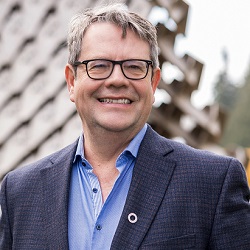
Chair and Centre Director – Michael Kobor, PhD
Edwin S.H. Leong UBC Chair in Healthy Aging – a UBC President’s Excellence Chair
Canada Research Chair in Social Epigenetics
Professor, Department of Medical Genetics, UBC Faculty of Medicine
Dr. Michael Kobor is a renowned biomedical researcher studying how our social environments and life experiences get “under the skin” through biological embedding to influence health and behaviour across the life span. As one of the world’s foremost experts in social epigenetics, he leads a program of interdisciplinary research with the goal of translating foundational genetic discovery into interventions and policy change to promote healthy life trajectories.
Dr. Kobor began his academic career in Germany, traveling to Canada to complete his PhD in molecular genetics with Dr. Jack Greenblatt at the University of Toronto, followed by a prestigious Human Frontier Science Postdoctoral Fellowship with Dr. Jasper Rine at the University of California, Berkeley. In 2005, he was recruited to UBC’s department of medical genetics to build an interdisciplinary team focused on developing a “society to cell” paradigm for population health research – one that continues to challenge established ways of thinking about how and why some people live longer, healthier lives.
As Canada Research Chair in Social Epigenetics, Dr. Kobor has authored more than 230 publications worldwide, has been cited over 10,000 times, and has attracted more than $180 million dollars in research funding. He regularly collaborates with leading scholars and elite universities around the world, bringing together experts in fields spanning molecular biology to anthropology and epidemiology, with a common purpose: to identify the epigenetic signatures of health and disease.
Dr. Kobor’s impressive body of work includes a highly-cited review paper on DNA methylation in Aging Cell in which he and his collaborators confirm the possibility of an “epigenetic clock” to provide an age-related biomarker for predicting future health decline. He is a key contributor to an international research collaboration dedicated to understanding why individuals in the world’s four “Blue Zones” are living longer and healthier lives than their age-matched peers in other countries. In addition, he is a committed partner in the development of the Canadian Longitudinal Study of Aging (CLSA), which follows 50,000 Canadians as they age. Already, his lab has developed 1,800 epigenetic profiles from the CLSA baseline collection that are now accessible to the broader research community – helping ensure that epigenetics becomes a foundational consideration of investigations into aging and age-related diseases well into the future.
To amplify this research and expand its reach, Dr. Kobor recently launched the UBC Social Exposome Research Excellence Cluster. This interdisciplinary effort spanning nine UBC faculties is investigating the health effects of social and environmental factors in order to influence policies and interventions to reduce health disparities across the life course. Dr. Kobor’s long-standing appointment as a Fellow of the Canadian Institute for Advanced Research (CIFAR) Child and Brain Development Program, and his past experience as both the Theme Director for “Healthy Starts” at BC Children’s Hospital Research Institute and the Sunny Hill BC Leadership Chair in Child Development, anchor the cluster and continue to drive its success.
Now, as the inaugural Edwin S.H. Leong UBC Chair in Healthy Aging – a UBC President’s Excellence Chair, Dr. Kobor will build UBC’s new comprehensive program of healthy aging research. Uniting faculty, trainees, and research personnel across UBC and engaging experts at universities around the world, he will lead new collaborations on a wide range of interrelated projects. The new Edwin S.H. Leong Healthy Aging Program aims to help us better understand what combination of genetics, environment, and lifestyle choices determine health, and how we might effectively intervene at any stage of disease vulnerability or disease progression to redefine the aging experience and improve quality of life.